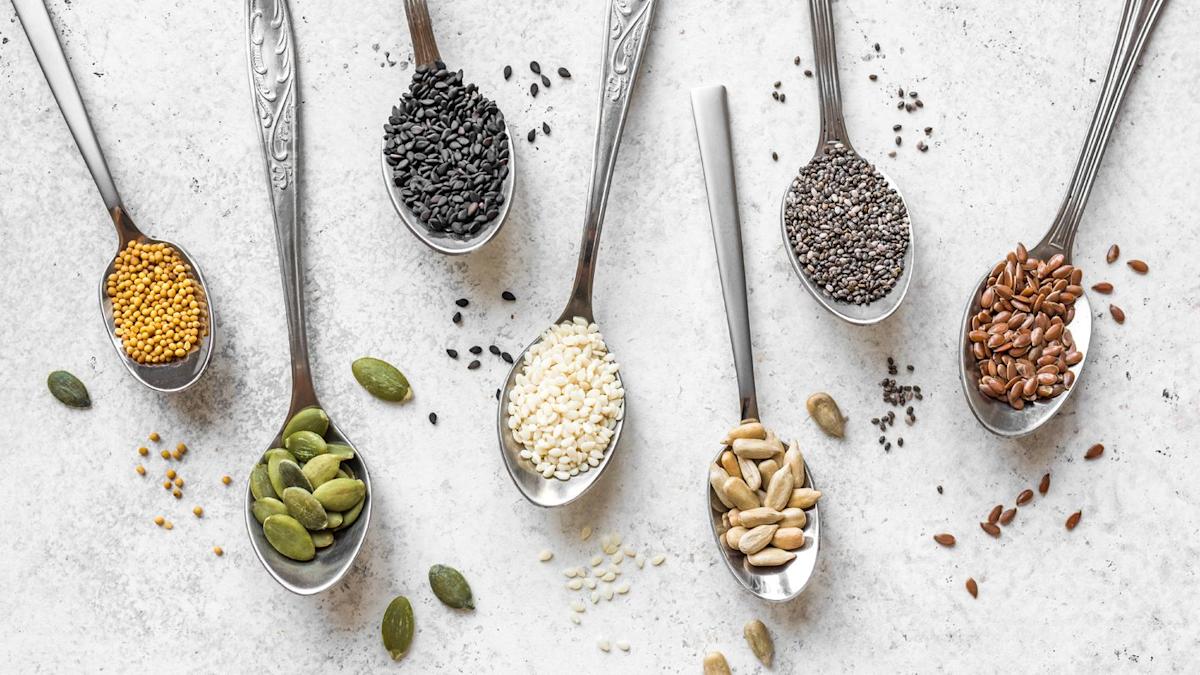If you’re aiming to hit your protein goals, don’t overlook a small but mighty source: seeds! Seeds are versatile and loaded with protein and other nutrients. Dietitians say you should eat more of them, whether you sprinkle them on salads or yogurt, blend them into a smoothie or just pop a handful into your mouth.
“Seeds are nutrient-rich powerhouses,” says Adiana Castro, M.S., R.D.N., a metabolic dietitian and owner of Compass Nutrition in New York City. “They are packed with protein, fiber, healthy fats, antioxidants, vitamins and minerals.”
Plant-based proteins, including seeds, “have a bonus effect because they contain both protein and fiber,” Castro says. These two nutrients promote blood sugar control, regulate appetite and amplify satiety to help you stay full longer. They’re also low in saturated fat and feed the good bacteria in the gut microbiome, she adds.
Along with packing a protein punch, seeds are generally rich in a range of vitamins and minerals, says Lena Beal, M.S., R.D.N., L.D., a spokesperson for the Academy of Nutrition and Dietetics. Many seeds also contain the plant compound lignans, which research shows may lower your risk of heart disease, breast cancer, menopause symptoms and osteoporosis. They’re also a source of phytosterols, which have been shown to lower cholesterol and have anti-inflammatory and immune system-boosting benefits. If that wasn’t enough, seeds contain variety of antioxidants and many are also rich in omega-3 fatty acids, both of which have anti-inflammatory properties.
If protein is what you’re after, focus on the six seeds below, which contain the most protein.
Hemp seeds
Hemp seeds have a mild, slightly nutty flavor and come from the Cannabis sativa plant (one that’s different from the marijuana-producing cannabis plant). Hemp seeds contain minimal amounts of THC, so they won’t give you a buzz, but they will give you a good amount of protein.
Three tablespoons of hemp seeds have about 9.5 grams of protein and 166 calories, according to the U.S. Department of Agriculture (USDA). They’re a complete protein, so they have all nine essential amino acids that your body can’t make on its own, says Rhyan Geiger, R.D.N., a registered dietitian focusing on plant-based nutrition.
Hemp seeds are also high in polyunsaturated fatty acids, including omega-3s, omega-6s, and vitamins E, D and A, which offer antimicrobial, antioxidant, and anti-inflammatory benefits, research shows.
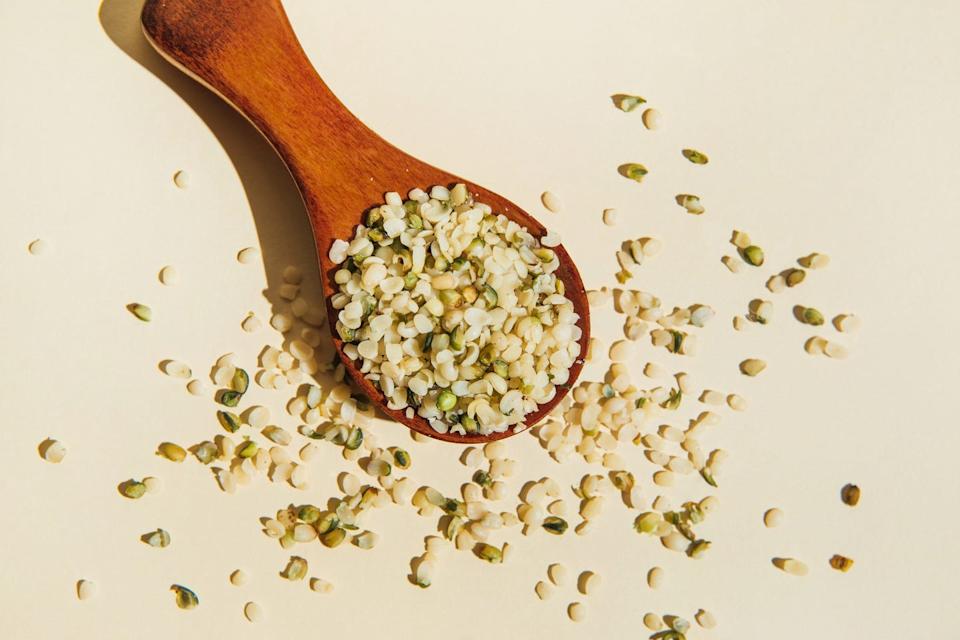
Tanja Ivanova
Pumpkin seeds
Also known as pepitas, pumpkin seeds has 8.6 grams of protein and 158 calories per ounce, according to the USDA. They’re good sources of magnesium (which may help keep blood pressure in check) and zinc (which could support your immune system). Some studies show the plant compounds in the seeds may even have anti-diabetic and anti-cancer properties.
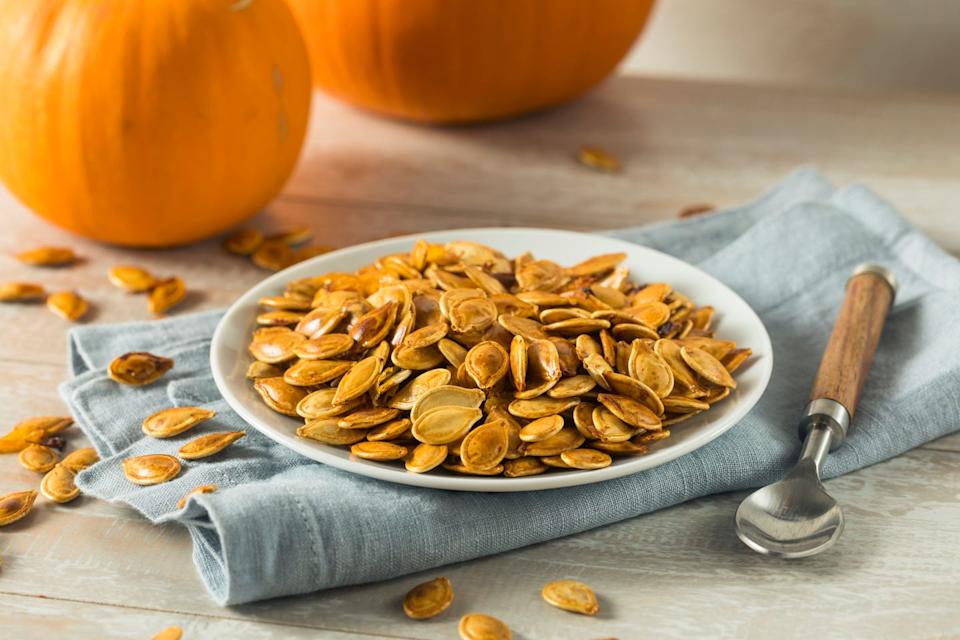
BHOFACK2
Sunflower seeds
These tiny seeds contain an impressive amount of protein: 5.5 grams per ounce (165 calories), according to the USDA. They’re also rich in vitamin E, B vitamins, and minerals like copper. Sunflower seeds have magnesium and pantothenic acid, too, which have been shown to reduce the likelihood of muscle cramps.
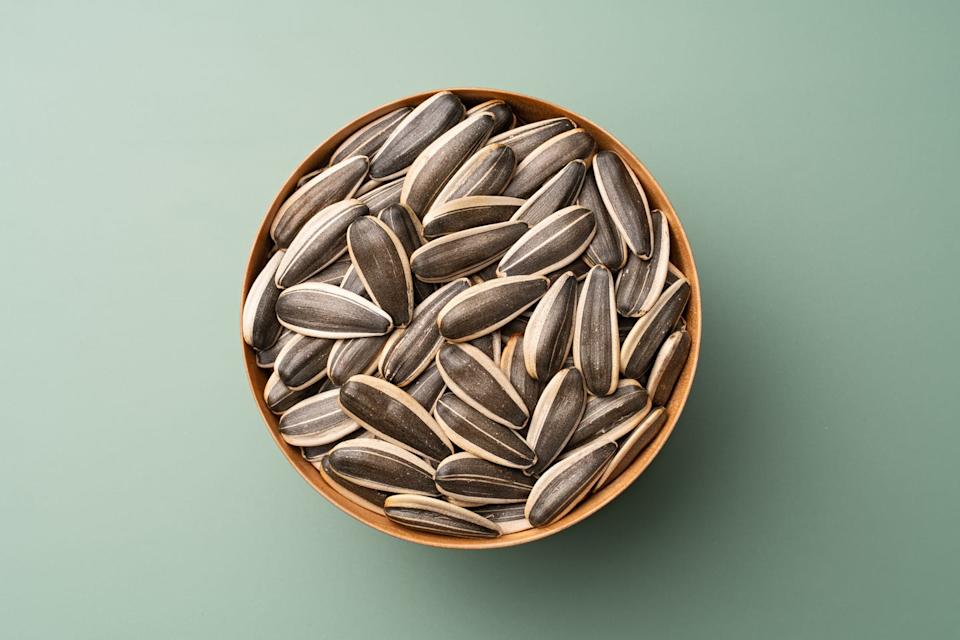
MirageC
Chia seeds
Like hemp seeds, chia seeds contain all nine essential amino acids, Geiger says. An ounce of chia seeds has 4.7 grams of protein and nearly 10 grams of fiber for 138 calories, USDA data shows. These tiny black seeds have been a part of Central American diets for centuries, according to Harvard Medical School.
RELATED: Are You Eating Chia Seeds the Right Way?
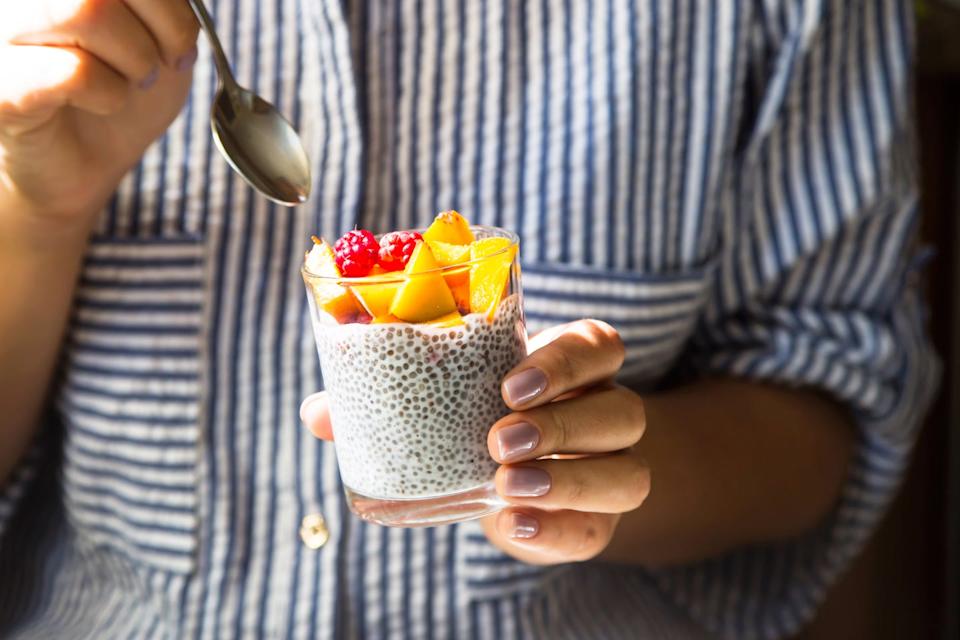
vsviridova
Flaxseeds
Just two tablespoons of these mild, nutty seeds ground up contain nearly 3 grams of protein, according to the USDA. Flaxseeds (which you can eat whole) contain omega-3 fatty acids and are full of antioxidants, according to the Mayo Clinic. They’re fiber-rich, with about 4 grams in two tablespoons, helping relieve constipation, increase satiety and maintain healthy cholesterol.
RELATED: High-Protein Breakfast Ideas That Will Keep You Fuller for Longer
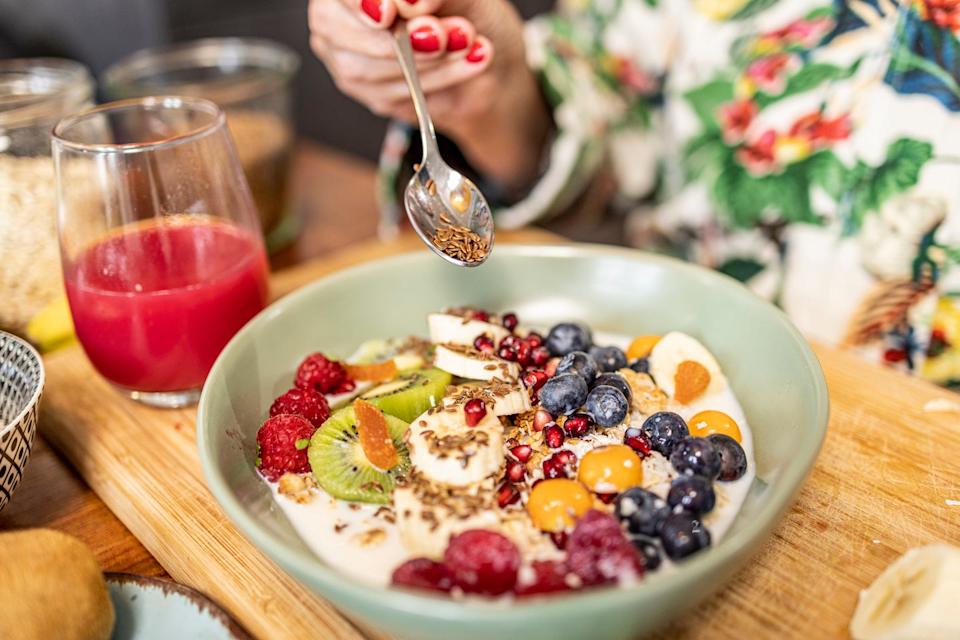
EMS-FORSTER-PRODUCTIONS
Sesame seeds
You may know them best as the little seeds topping a hamburger bun or ground up into a paste to make tahini, but sesame seeds are much more versatile. Try sprinkling them on stir-fry or avocado toast, or use them to encrust chicken or fish before grilling. A tablespoon contains about 1.6 grams of protein and 52 calories, according to the USDA.
They also contain a number of vitamins and minerals, including selenium, which research shows may decrease your risk for chronic diseases. The nutrients in sesame seeds have antioxidant, cholesterol-reducing, blood lipid-regulating, anti-inflammatory, and anti-tumor benefits, according to a comprehensive research review. Plus, the seeds offer liver, kidney and cardiovascular system protection, too.
RELATED: Try Our Recipe for Black Sesame Sablés
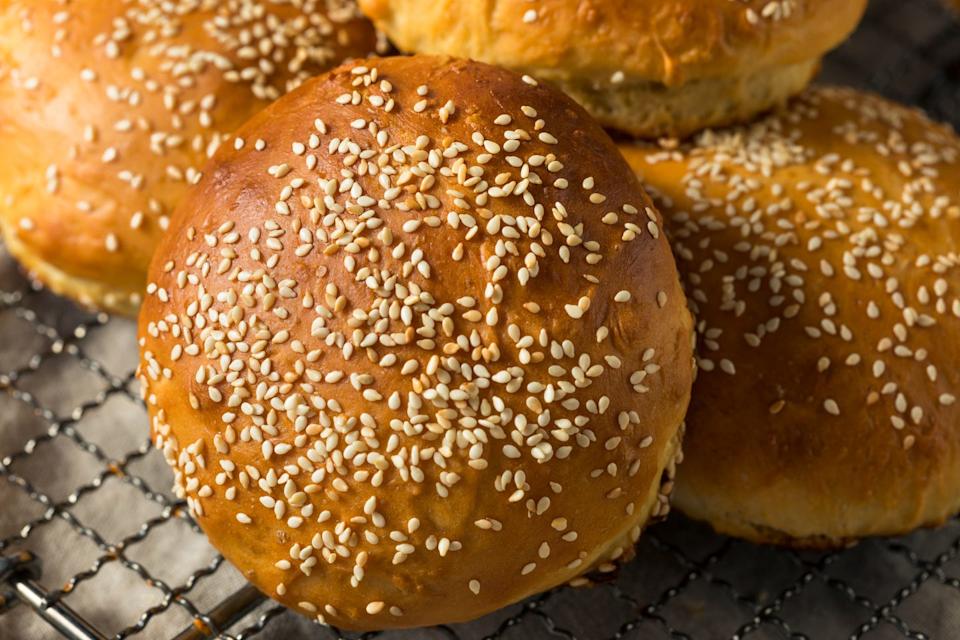
BHOFACK2
How many seeds should you eat?
“Seeds can be part of a balanced diet and help reach the recommended amount for healthy fats, fiber, protein and micronutrients like iron, zinc and calcium,” Geiger says. Unless you have a food allergy or sensitivity, most people can eat seeds every day, Castro says. She suggests aiming for 1 to 2 tablespoons a day to tap into their protein, healthy fat and fiber benefits. “A little goes a long way,” she says. However, excessive amounts of seeds — that is, more than 5 or 6 tablespoons a day consistently — could cause bloating, gas or constipation, Beal points out. If you already have gut sensitivities or problems, pay attention to your seed intake. Seeds are also calorie-dense, which could contribute to weight gain if you eat too many, she says.

Hearst Owned
How to add seeds to your diet
Seeds are incredibly versatile, Geiger says. “Because seeds are so small, they can be easily added to many dishes.” She suggests sprinkling them on top of avocado toast, using ground flaxseeds as an egg replacement in baking or blending chia seeds into a smoothie. Stir chia or flax seeds into oatmeal overnight oats, top yogurt or smoothies with hemp seeds or sprinkle sunflower or other seeds on salads, grain bowls or fruit, Beal says. Seeds really go with anything, Castro adds. “I love adding seeds to a common food you are already familiar with eating.”

Hearst Owned
You Might Also Like
